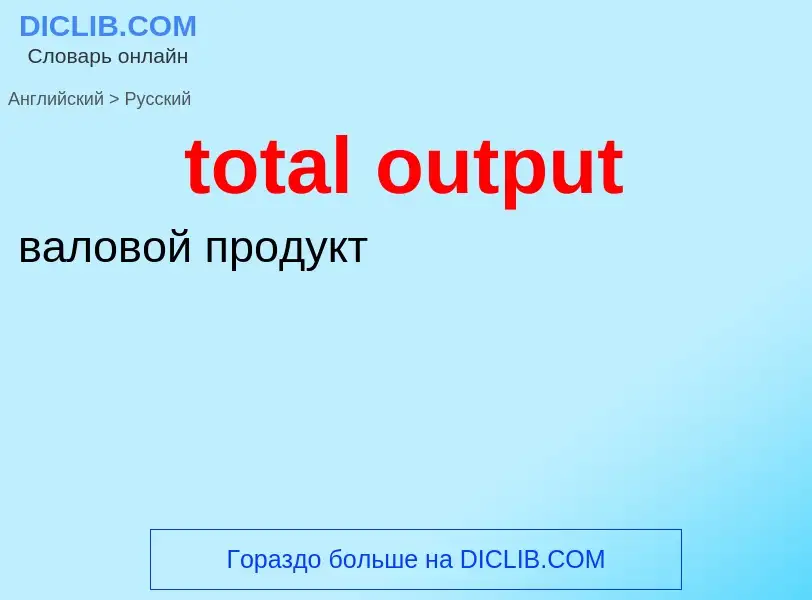Übersetzung und Analyse von Wörtern durch künstliche Intelligenz ChatGPT
Auf dieser Seite erhalten Sie eine detaillierte Analyse eines Wortes oder einer Phrase mithilfe der besten heute verfügbaren Technologie der künstlichen Intelligenz:
- wie das Wort verwendet wird
- Häufigkeit der Nutzung
- es wird häufiger in mündlicher oder schriftlicher Rede verwendet
- Wortübersetzungsoptionen
- Anwendungsbeispiele (mehrere Phrasen mit Übersetzung)
- Etymologie
total output - Übersetzung nach russisch
общая лексика
(общее количество единиц продукции, произведенное за определенный период (напр. год))
экономика
валовой [совокупный] выпуск [объем производства]
валовое производство
валовая продукция
нефтегазовая промышленность
суммарная добыча
синоним
общая лексика
устройство вывода
электронное или электромеханическое устройство, соединённое с компьютером и используемое для отображения данных, выводимых из компьютера
Смотрите также
Definition
Wikipedia
Gross domestic product (GDP) is a monetary measure of the market value of all the final goods and services produced and sold in a specific time period by a country or countries, generally "without double counting the intermediate goods and services used up to produce them". GDP is most often used by the government of a single country to measure its economic health. Due to its complex and subjective nature, this measure is often revised before being considered a reliable indicator. GDP (nominal) per capita does not, however, reflect differences in the cost of living and the inflation rates of the countries; therefore, using a basis of GDP per capita at purchasing power parity (PPP) may be more useful when comparing living standards between nations, while nominal GDP is more useful comparing national economies on the international market. Total GDP can also be broken down into the contribution of each industry or sector of the economy. The ratio of GDP to the total population of the region is the per capita GDP (also called the Mean Standard of Living).
GDP definitions are maintained by a number of national and international economic organizations. The Organisation for Economic Co-operation and Development (OECD) defines GDP as "an aggregate measure of production equal to the sum of the gross values added of all resident and institutional units engaged in production and services (plus any taxes, and minus any subsidies, on products not included in the value of their outputs)". An IMF publication states that, "GDP measures the monetary value of final goods and services—that are bought by the final user—produced in a country in a given period of time (say a quarter or a year)."
GDP is often used as a metric for international comparisons as well as a broad measure of economic progress. It is often considered to be the world's most powerful statistical indicator of national development and progress. However, critics of the growth imperative often argue that GDP measures were never intended to measure progress, and leave out key other externalities, such as resource extraction, environmental impact and unpaid domestic work. Critics frequently propose alternative economic models such as doughnut economics which use other measures of success or alternative indicators such as the OECD's Better Life Index as better approaches to measuring the effect of the economy on human development and well being.



 per capita in 2022 by IMF.png?width=200)
![YoY]] Quarterly gross domestic product growth rate YoY]] Quarterly gross domestic product growth rate](https://commons.wikimedia.org/wiki/Special:FilePath/Quarterly gross domestic product.png?width=200)
![CO<sub>2</sub> emissions]] from fossil-fuel combustion and industrial processes changed compared with global GDP.<ref name="gdp-affluence" /> CO<sub>2</sub> emissions]] from fossil-fuel combustion and industrial processes changed compared with global GDP.<ref name="gdp-affluence" />](https://commons.wikimedia.org/wiki/Special:FilePath/Relative change in main global economic and environmental indicators from 1970 to 2017.webp?width=200)



![[[Colossal Cave Adventure]] being played on a [[VT100]] terminal [[Colossal Cave Adventure]] being played on a [[VT100]] terminal](https://commons.wikimedia.org/wiki/Special:FilePath/Colossal Cave Adventure on VT100 terminal.jpg?width=200)
-4.jpg?width=200)
![A pair of [[computer speaker]]s and a [[subwoofer]] used in a desktop environment A pair of [[computer speaker]]s and a [[subwoofer]] used in a desktop environment](https://commons.wikimedia.org/wiki/Special:FilePath/Creative T4 Wireless 2.1 Speakers.jpg?width=200)
![An [[LCD monitor]] in use An [[LCD monitor]] in use](https://commons.wikimedia.org/wiki/Special:FilePath/Ecran plat wikipedia.jpg?width=200)


